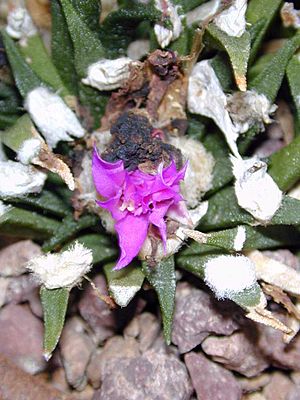Ariocarpus agavoides facts for kids
Quick facts for kids Ariocarpus agavoides |
|
|---|---|
 |
|
| Conservation status | |
| Scientific classification |
|
| Kingdom: | Plantae |
| Clade: | Tracheophytes |
| Clade: | Angiosperms |
| Clade: | Eudicots |
| Order: | Caryophyllales |
| Family: | Cactaceae |
| Subfamily: | Cactoideae |
| Genus: | Ariocarpus |
| Species: |
A. agavoides
|
| Binomial name | |
| Ariocarpus agavoides (Castañeda) E.F.Anderson
|
|
| Script error: The function "autoWithCaption" does not exist. | |
Script error: No such module "Check for conflicting parameters".
Ariocarpus agavoides (also known as the Magueyito or Tamaulipas living rock cactus) is a special type of cactus. It grows only in Mexico. This cactus lives in dry, rocky areas. It likes places with lots of limestone.
Description
This cactus is a small plant. It looks like a rosette, which is a circular shape. It has short, stiff, dark green parts called tubercles. These tubercles look a lot like small leaves from plants like Aloe. The cactus stem is round and flat. It is greenish-brown and can be up to 6 centimeters (about 2.25 inches) long. It can be up to 8 centimeters (about 3 inches) wide. Most of the plant is a root that grows underground.
The tubercles spread out and are soft. They are flat on the top side. Small areas called areoles are found halfway up these "pseudo-leaves." These areoles can be up to 1.2 centimeters long. Some of these cacti do not have spines. Others have whitish spines that can be up to 1 centimeter long.
When the plants are 5 to 8 years old, they start to grow flowers. These flowers are a bright magenta color. They can be up to 5 centimeters long. The pistils (female parts of the flower) are deep yellow. The stamens (male parts of the flower) are white. After flowering, the cactus grows round, reddish fruit. These fruits can be up to 2.2 centimeters long.
Habitat and Distribution
The A. agavoides cactus grows in a small area. It is found in the rocky limestone hills of Tamaulipas and San Luis Potosí in Mexico. It grows at about 1200 meters (about 3900 feet) above sea level.
Conservation Actions
This cactus is an endangered species. This means it is at high risk of disappearing forever. The International Union for Conservation of Nature (IUCN) lists it as endangered. It is also listed on CITES Appendix I. CITES is an agreement that protects endangered plants and animals.
It is against the law to collect this cactus in Mexico. The Mexican government protects it under a national list of species at risk. Even with these rules, the cactus is sometimes still sold illegally. This makes it harder to protect this special plant.
See also
 In Spanish: Ariocarpus agavoides para niños
In Spanish: Ariocarpus agavoides para niños
 | Misty Copeland |
 | Raven Wilkinson |
 | Debra Austin |
 | Aesha Ash |


